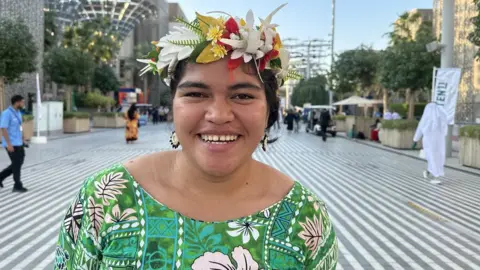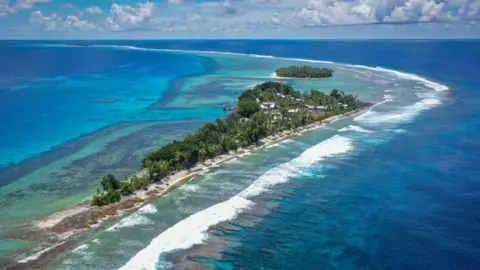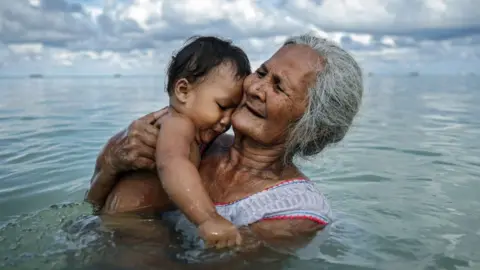COP28: Tuvalu negotiator travelled 8,000 miles to save her home. Can she?
 BBC
BBCThe UN climate talks start haggling over how to protect the oceans on Saturday - and one woman will be closely watching.
Mervina Paueli, 25, has come to Dubai to negotiate a future for her home, Tuvalu - a group of low-lying Pacific islands.
We owe the oceans a lot - by absorbing heat, they protect us from the full cost of global warming.
If this summit agrees to slash fossil fuel use, oceans could be a big winner.
This is Mervina's first COP summit - she was in the air for 24 hours, flying from Fiji to Hong Kong before finally landing here in the United Arab Emirates.
"We all have that umbilical cord attachment to our lands. Anything for my country is worth it," she says.
 Getty Images
Getty ImagesAs a negotiator with Tuvalu's team, she belongs to a club no-one wants to join - a community facing a wipe-out of home and history.
"The numbers are not looking good for Tuvalu. Picturing it just not being there anymore makes me feel really sad," she says.
She talks about the white sands and beautiful clear waters lying either side of her family home.
Sea levels are 0.15 metres higher than 30 years ago, with an average increase rate of 5mm a year. That increase is expected to speed up and by 2050 the sea will be be 20cm higher than it is today.
The islanders' culture, history and livelihood is totally reliant on the seas. They need healthy oceans with good fish stocks, and crucially, limited or no rise in sea levels.
That relationship is not unique to this population of a few thousand.
The oceans have provided a "great service" to Earth and everything that lives on it, says Ko Barrett, senior climate advisor at the US's National Oceanic and Atmospheric Administration (NOAA) and vice chair of the Intergovernmental Panel on Climate Change (IPCC).
Their dark waters have absorbed 90% of the warming humans have created by burning coal, oil and gas and releasing greenhouse gases into the atmosphere.
But that service could soon end. Oceans are showing signs of huge stress from climate change, pollution and loss of habitats.
Metres away from the politicians at COP28, the waters shimmering off the shores of Dubai are close to 30C. In July, the average global ocean temperature reached its highest on record.
 Getty Images
Getty ImagesIn Tuvalu, tuna are relocating to cooler waters, pushing fishermen further and further away from the shores, Mervina explains.
Despite this, oceans are the "poor cousin" of climate talks, the UN Special Envoy on Oceans Peter Thompson says, speaking at the Oceans Pavilion at COP28.
The first time oceans were mentioned in a UN climate talks deal was just two years ago, he explains.
On Saturday ministers from major ocean nations - including the US, Norway, and the Seychelles - meet to discuss next steps and how they can provide climate solutions including renewable power from tidal energy.
More than 100 organisations have signed the Dubai Oceans Declaration - including scientists anchored on a ship off the coast of Peru, frantically working to understand how long oceans have left before they start pumping out heat.
Collette Kelly from the Woods Hole Oceanographic Institution is on board, hanging instruments from the ship's side to measure nitrogen levels and acidification, both signs of higher ocean temperatures in the waters deep below.
The Dubai Oceans Declaration calls for investment in ocean science, so experts can better understand issues like rising sea levels and the death of coral reefs.
"Put simply, the ocean is one of the best solutions we have to tackle climate change. Governments must commit to ocean-based action in their national climate goals, strategies and policies," says Tom Pickerell, director of the ocean programme at the World Resources Institute.
But it may be too late for Pacific Islanders. Sea level rise has been baked into Earth's system by melting glaciers, and it is uncertain whether sea surface temperatures will stabilise at cooler levels.
Recognising the existential threat facing these communities, in November close neighbour Australia offered climate refugee visas to Pacific Islanders.
Mervina says she would not take up the offer. "No. I just love Tuvalu. I would lose my culture and community where everybody knows each other, everybody helps each other," she explains.
She describes a New Year's eve party on her grandmother's island.
"We were children but we stayed up until four o'clock in the morning. Everyone was dancing the traditional fakaseasea - the kids beating tin cans. Whenever you hear it, you join it. Whoever wants to join starts dancing," she says.
She plans to stay and fight for this community and tell COP28 it must save her island home.
